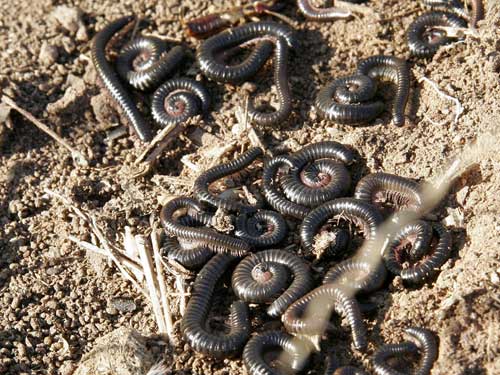 The millipede infestation of Grand Bahama took a new twist yesterday when it was revealed the pest is able to secrete an acid which can burn human skin.
The millipede infestation of Grand Bahama took a new twist yesterday when it was revealed the pest is able to secrete an acid which can burn human skin.
As previously reported in The Freeport News, residents across the island are concerned and aggravated with the influx of the small, worm-like creatures.
Millipedes are often mistaken for centipedes, but unlike their bigger cousins, millipedes don’t attack people and are not known to be dangerous.
However, 18-year-old Ricardo Pierre feels differently about the matter and he says he has the scar to prove why.
While sleeping in bed, he claims he was bitten by a millipede.
“I felt something crawling on me so I got up and brushed it off but when I got up in the morning my arm was swollen. I went back to my bed to look around and lone and behold there was a black millipede lying right by my pillow,” said Pierre.
He added that at first he had mistaken the creature for a centipede but after speaking with other relatives, they confirmed that it indeed was a millipede.
Pierre said, “I am still in shock and so were the nurses who treated me at the hospital because they couldn’t believe it was a millipede, but I have the scar to prove it.”
Pest control specialist Lamont Evans, of Bugs-Or-Us, said it is highly unlikely that Pierre suffered a bite from a millipede but may have gotten burned by the acid fluid found inside one.
He said, “Millipedes don’t bite, they don’t sting and they don’t have teeth. They are decomposing insects filled with acid chemicals, which help them break down the soil. They can leave imprints on the skin and cause skin irritations.”
Evans went on to say, “They are part of the environment and this time of the year you see more than usual because of the increase in dampness and humidity.
“For those persons living in areas where there is a lot of bush and trees or who may use compost in their yards should expect to see high numbers of insects especially millipedes.
“My best advice to anyone suffering from a millipede infestation is to get your yard sprayed on a monthly basis if not twice a month to help get rid of and prevent millipedes from returning, because once they’re in the yard, they will eventually begin climbing the walls and come inside your homes.”
Freeport News reader Shavantee Bowleg said, ‘I’m not afraid of them I just hate seeing them all over my walls and my yard and even crawling around in my house. They’re sickening and annoying!”
By Desiree Joseph
Freeport News Reporter
